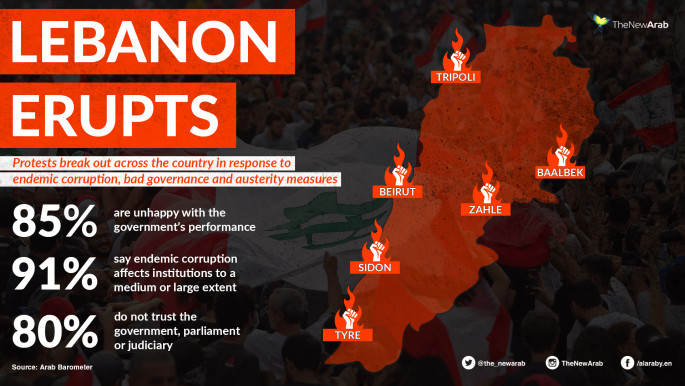Lebanese protesters outside Hassan Diab's home demand resignation of new PM
Lebanon is without a cabinet and in the grips of a deepening economic crisis after a two-month-old protest movement forced Saad Hariri to stand down as prime minister on October 29.
Anti-government protests continued after Hariri's resignation, while political parties negotiated for weeks before nominating Diab, a professor and former education minister, to replace him on December 19.
Echoing protester demands, Diab promised to form a government of independent experts within six weeks - in a country where appointing a cabinet can take months.
But protesters on Saturday were unconvinced by his promise.
"We're here to bring down Hassan Diab. He doesn't represent us. He's one of them," said one young demonstrator, referring to the country's ruling elite, who protesters despise collectively.
Lina, another protester agreed, saying: "It's the revolution that must name the prime minister, not them."
The 60-year-old Diab, who has a low public profile and styles himself as a technocrat, last week called protester demands legitimate but asked them to give him a chance to form "an exceptional government".
 |
"We are willing to give him a chance, but let us at least give him a roadmap," Lina told AFP.
"The names don't matter to us, we want policy plans, what is his programme?" she asked.
Protesters decry Diab's participation as a minister in a government deemed corrupt.
The support given to him by powerful Shia movement Hezbollah also angers many protesters and pro-Hariri Sunnis.
The protests and political deadlock have brought Lebanon to its worst economic crisis since the 1975-1990 civil war.
The local currency has taken a nose dive, losing more than 40 percent of its value after over 20 years of being pegged to the dollar.
Banks are imposing unprecedented capital controls to protect their deposits amid a deepening confidence crisis. Meanwhile, layoffs and salary cuts are becoming the norm while politicians bicker over forming a new government.
Dozens of Lebanese protesters held a brief sit-in inside a bank in Beirut and another in the country's south on Saturday, part of their focus on banking policies they complain are inefficient and corrupt.
The protesters entered a private bank in the commercial Hamra district in Beirut, protesting capital controls and insisting that no one would leave without the money they came for. Banks have put a withdrawal ceiling of $200 a week on most accounts, while totally blocking outside transfers.
Comment: In 2020, Arab citizens and states will step up epic battle to define the region
"Thieves! Thieves!" two dozen protesters chanted, some sitting on counters and others on the floor. Bank staff watched, and the security guards did not interfere.The protesters have also organized a campaign called "we are not paying" asking depositors not to pay their loans amid the tight capital controls.
The anti-bank protests were fanned by recent comments from the Central Bank's governor saying he doesn't know how much further the local currency will lose its value. Riad Salameh's comments to reporters Thursday deepened panic in the highly dollarised economy.
Lebanon imports most of its basic needs, and is one of the world's most indebted countries. Some protesters are calling for banks to finance imports instead of servicing debts.
Lebanese officials have asked foreign countries and financial institutions to help secure needed capital for imports.
Donors have called for major reforms before extending help - a request that will likely be delayed amid infighting between political groups over the shape of a new government.
The international community has urged a new cabinet to be formed swiftly to implement economic reforms and unlock international aid.
Follow us on Twitter and Instagram to stay connected



